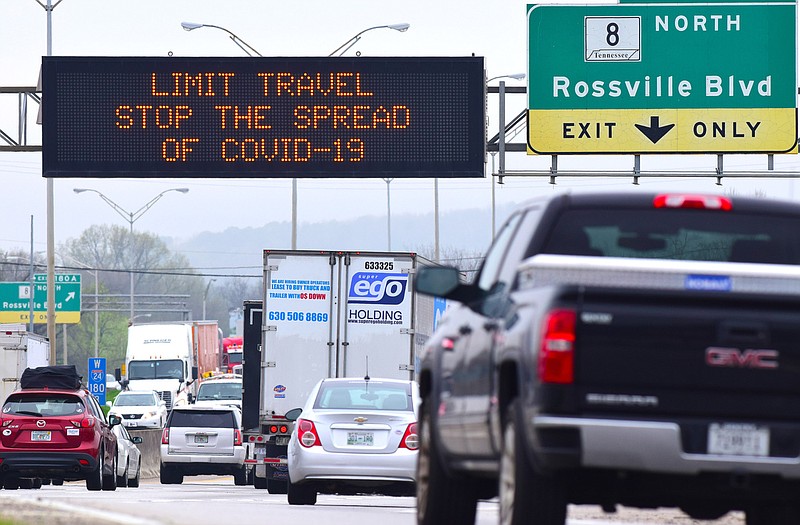NASHVILLE, Tenn. (AP) - Tennessee Gov. Bill Lee on Wednesday proposed funneling money into relief for tornado and health crises, scaling back planned teacher raises, and socking more cash away into reserves, as the state reacted to the global impact of the coronavirus on everyday life.
The Republican's administration unveiled the scaled-back budget to lawmakers, who are scrambling to pass the spending plan for the 2020-21 fiscal year and other items they said are "mission critical" before they recess this week and head back to work as soon as June 1.
"We are now likely embarking on a recession caused by this rare health pandemic," state Finance Commissioner Stuart McWhorter told lawmakers.
Some of Lee's proposals are directly related to budgeting, the recent deadly tornadoes and the growing coronavirus pandemic. Others veered off into unrelated territory, including election law changes.
Lawmakers kept working in close quarters despite federal guidance for people to keep their distance. The legislative building remained closed to the general public, which was encouraged to watch proceedings online.
Lee's latest budget - which has a suggested 0% economic growth rate - creates a $150 million fund "to help us be responsive to health and safety issues resulting from COVID-19," and sets aside $575 million to increase the state's rainy day fund to $1.45 billion by 2021.
Lee also is planning an additional $30 million this budget year for the Tennessee Emergency Management Agency's disaster relief fund.
At the same time, Lee is now slashing his original proposed teacher pay increases from 4% to 2% and eliminated a proposed $250 million K-12 mental health trust fund.
The plan also drops an earlier push to cut a professional privilege tax on agents, broker-dealers, investment advisers, osteopathic physicians and physicians, worth $40 million annually.
One component not on the chopping block: Lee's education voucher program in Nashville and Memphis' Shelby County, which he said remains on schedule for a roll-out next school year.
Meanwhile, the GOP-dominant Legislature considered proposals that would ease requirements for schools choosing to close amid the virus outbreak and tweaked the state's open meeting law to allow officials to meet electronically rather than in person during the pandemic.
Lawmakers continued to advance a bill that would rework restrictions on voter registration groups. The Republican-led Legislature passed the controversial restrictions last year, but the law was blocked by a federal judge and a trial has been scheduled for April 2021.
Another bill would allow the use of voting "super sites" if some polling places aren't usable during emergencies, largely in response to the tornadoes. In the same proposal, lawmakers voted against creating a new category of absentee voters who fear they will be exposed to a contagion that has caused the governor to declare a state of emergency.
Under the school measure, Tennessee's student assessment test - known as TNReady - would be canceled and the required 180 days of classroom instruction for the 2019-2020 school year would be waived.
Education Commissioner Penny Schwinn submitted a waiver to the federal government earlier this week asking for approval to waive certain testing and attendance requirements, but her agency says that Tennessee also needs sign-off from the Legislature to do so.
The bill acknowledges that schools may be closed indefinitely, noting that "the health and safety risks to Tennesseans from COVID-19 are not yet fully understood and may necessitate school closures beyond March 31, 2020."
Other provisions in the bill include ensuring full state funding despite student attendance; dropping the requirement that high school students must pass a civics test to graduate; eliminating the 11th-grader college readiness exam; and ensuring that eligible seniors aren't prevented from graduating on time.
For most people, the new coronavirus causes only mild or moderate symptoms, such as fever and cough. For some, especially older adults and people with existing health problems, it can cause more severe illness, including pneumonia.
The vast majority of people recover from the new virus. According to the World Health Organization, people with mild illness recover in about two weeks, while those with more severe illness may take three to six weeks to recover.
Tennessee had 99 confirmed cases as of Wednesday, most of them in Middle Tennessee. Meanwhile, more high-profile events scheduled more than a month away continued to be postponed - including the popular musical festival Bonnaroo and the St. Jude Rock 'n' Roll Nashville Marathon & 1/2 Marathon have been pushed back later this year.
Lee says that he has not yet been tested because he has not shown any symptoms but that some members of his team have done so and are in self-quarantine.
___
The Associated Press receives support for health and science coverage from the Howard Hughes Medical Institute's Department of Science Education. The AP is solely responsible for all content.
